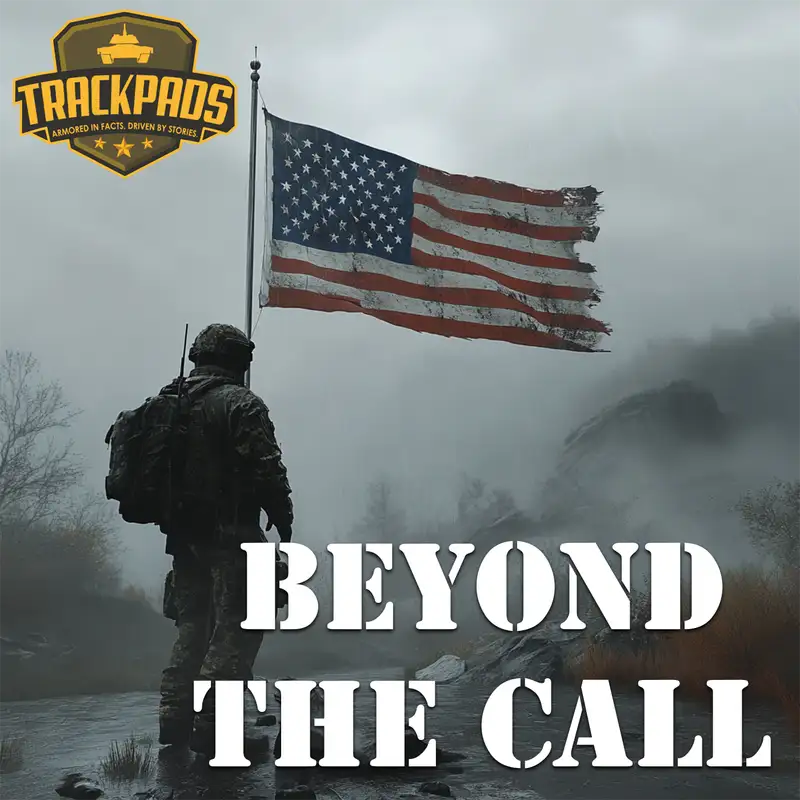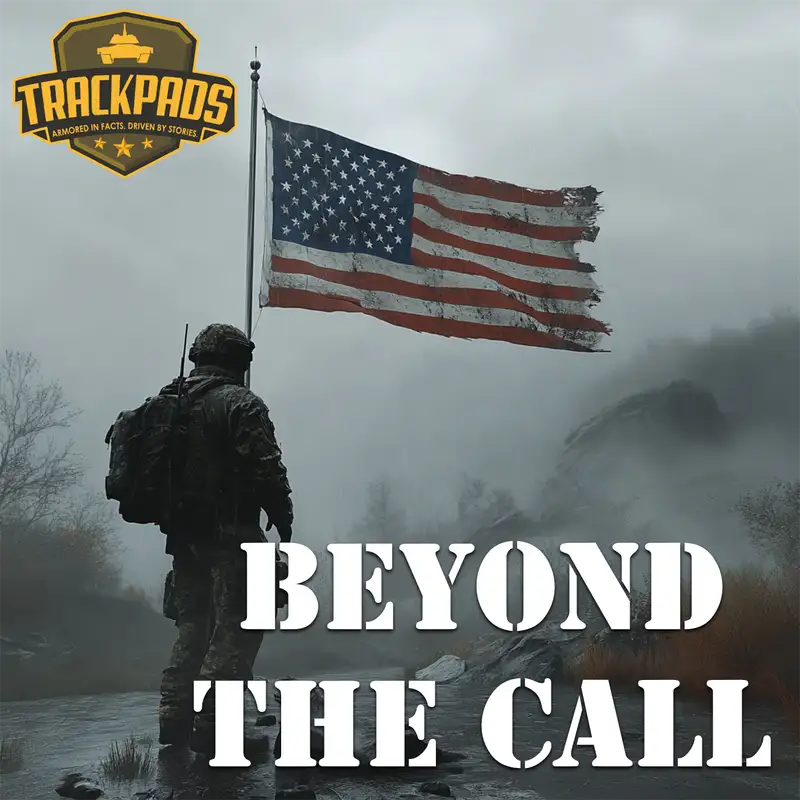Rodolfo Hernández's Heroic Stand on Hill 420
Welcome to Beyond the Call, where history, leadership, and heroism come alive.
Today’s episode explores the remarkable story of Rodolfo Pérez Hernández, a powerful story of courage and perseverance.
If you enjoy learning more about military history and extraordinary individuals, be sure to visit Track pads dot com for articles, podcasts, and more.
Introduction
Rodolfo Pérez Hernández, known as "Rudy," distinguished himself by extraordinary acts of bravery during the Korean War, earning the prestigious Medal of Honor.
A member of Company G, One Hundred Eighty-Seventh Airborne Regimental Combat Team, Hernández exhibited incredible heroism under extreme conditions near Wonton-ni, Korea, on May thirty-first, nineteen fifty-one.
Despite severe wounds, including a grave head injury, Hernández continued fighting, his relentless spirit enabling his platoon to repel an overwhelming enemy counterattack and retake critical positions.
The battle on Hill Four Twenty provides a powerful insight into Hernández's heroism, exemplified by a moment that defines courage under fire.
Severely injured and momentarily incapacitated, Hernández regained consciousness, ignored his injuries, and charged the advancing enemy with rifle and bayonet.
His remarkable action, which temporarily halted the enemy's advance, epitomizes the extraordinary sacrifice and valor recognized by the Medal of Honor.
Historical Context
The Korean War erupted in June of nineteen fifty, marking one of the earliest and most critical conflicts of the Cold War.
Following World War Two, the Korean Peninsula was divided along the thirty-eighth parallel into Soviet-controlled North Korea and United States-influenced South Korea.
Tensions between these two ideological camps quickly escalated into open warfare when North Korean forces invaded the South, prompting a significant military intervention led by the United States under the auspices of the United Nations.
Geopolitically, the Korean War represented a pivotal struggle between communism and democracy, with profound implications for global peace and security.
Major world powers, including China and the Soviet Union, supported North Korea's aggressive campaign, providing logistical aid, arms, and troops.
Conversely, South Korea received substantial military and economic support primarily from the United States and other Western allies, highlighting the international stakes and ideological dimensions underpinning the conflict.
Amidst this turbulent backdrop, key battles defined the course and outcome of the war, such as the fierce engagements at Pusan, Inchon, and Chosin Reservoir.
These battles underscored the brutal, often fluid nature of combat, characterized by rapid territorial changes and intense fighting in challenging terrain.
Soldiers faced freezing temperatures, relentless enemy offensives, and grueling close-quarter battles, severely testing their endurance and morale.
Rodolfo Hernández served in the One Hundred Eighty-Seventh Airborne Regimental Combat Team, a highly mobile and skilled fighting unit renowned for its effectiveness and tactical innovation.
The One Hundred Eighty-Seventh participated prominently in airborne operations and fierce ground engagements, establishing itself as a critical component of the United Nations' efforts to regain lost territory.
Hernández’s Company G played an especially pivotal role during key counteroffensives, showcasing the airborne unit's remarkable bravery and resilience under extreme pressure.
The battle at Hill Four Twenty, near Wonton-ni, became a defining episode of the Korean War, symbolizing the gritty and relentless combat typical of the conflict.
Situated strategically, control of the hill was essential for maintaining defensive positions and enabling further offensive operations.
The ferocious counterattack by enemy forces on May thirty-first, nineteen fifty-one, and the extraordinary heroism displayed by Hernández and his fellow soldiers underscore the immense personal sacrifices that ultimately defined this brutal, protracted war.
Personal Background
Rodolfo Pérez Hernández was born on April fourteenth, nineteen thirty-one, in Colton, California, to parents of Mexican heritage.
Growing up, Hernández experienced the challenges and aspirations typical of many young Americans of his generation, marked by the struggles of the Great Depression and the upheaval of World War Two.
Motivated by a desire to serve and defend his nation, Hernández enlisted in the United States Army in nineteen forty-eight, at the age of seventeen, with his parents' consent.
After completing basic training, Hernández volunteered for paratrooper school, where he distinguished himself through rigorous airborne training.
He served in Germany until the outbreak of the Korean War, when he and his unit were rapidly deployed to combat.
Following his heroic actions and severe wounds in Korea, Hernández underwent extensive rehabilitation, eventually regaining partial use of his right arm and adapting to write with his left hand.
After the war, he settled in Fayetteville, North Carolina, married, had three children, and became actively involved in veterans' events, honored frequently for his remarkable bravery.
Medal of Honor Citation
Corporal Hernández, a member of Company G, distinguished himself by conspicuous gallantry and intrepidity above and beyond the call of duty in action against the enemy.
His platoon, in defensive positions on Hill Four Twenty, was under ruthless attack by a numerically superior and determined hostile force accompanied by heavy artillery, mortar, and machine-gun fire which inflicted numerous casualties.
When his unit’s ammunition began to run low, Corporal Hernández volunteered to leave his foxhole to replenish the supply and, while performing this heroic act, was critically wounded by enemy artillery fire.
Although severely wounded, he refused to be evacuated and continued to distribute ammunition and encourage his comrades.
After the hostile artillery fire subsided and enemy infantry commenced an overwhelming assault, Corporal Hernández, partially blinded and suffering intense pain, rushed from his position, wielding his bayonet and rifle with extraordinary effectiveness, personally killing six enemy soldiers before falling unconscious from grenade, bayonet, and bullet wounds.
His heroic action disrupted the enemy attack and enabled his unit to counterattack and regain control of the vital position.
Corporal Hernández’s indomitable fighting spirit, outstanding courage, and tenacious devotion to duty reflect the highest credit upon himself, the infantry, and the United States Army.
Reflections and Lessons Learned
Rodolfo Pérez Hernández's story is a profound testament to the power of personal courage and unwavering dedication to duty.
His willingness to place himself directly in harm’s way to ensure his comrades had the ammunition they needed exemplifies selfless leadership in the most dire circumstances.
Hernández's actions remind us that true heroism often manifests in the form of sacrifice for others, driven by loyalty, honor, and an unyielding commitment to mission success.
Hernández’s legacy carries significant relevance for modern military leaders and individuals seeking inspiration in overcoming adversity.
His relentless determination, even when severely wounded and partially blinded, underscores the importance of resilience and inner strength when confronting seemingly insurmountable challenges.
In contemporary contexts, whether in military operations, crisis management, or everyday leadership scenarios, Hernández's example illustrates that courage, perseverance, and clarity of purpose can profoundly influence outcomes even under intense pressure.
The narrative of Hernández's valor serves not only as a historical lesson but also as an enduring example of ethical courage.
His actions reflect a deeply embedded moral compass guiding him to prioritize his fellow soldiers’ welfare above his own survival.
Closing
Thank you for joining me on today’s episode of Beyond the Call.
If you would like to dive deeper into more stories of bravery, leadership, and history, visit Trackpads dot com.
Until next time, keep exploring, stay inspired, and remember, the lessons of the past shape the warriors of the future.

